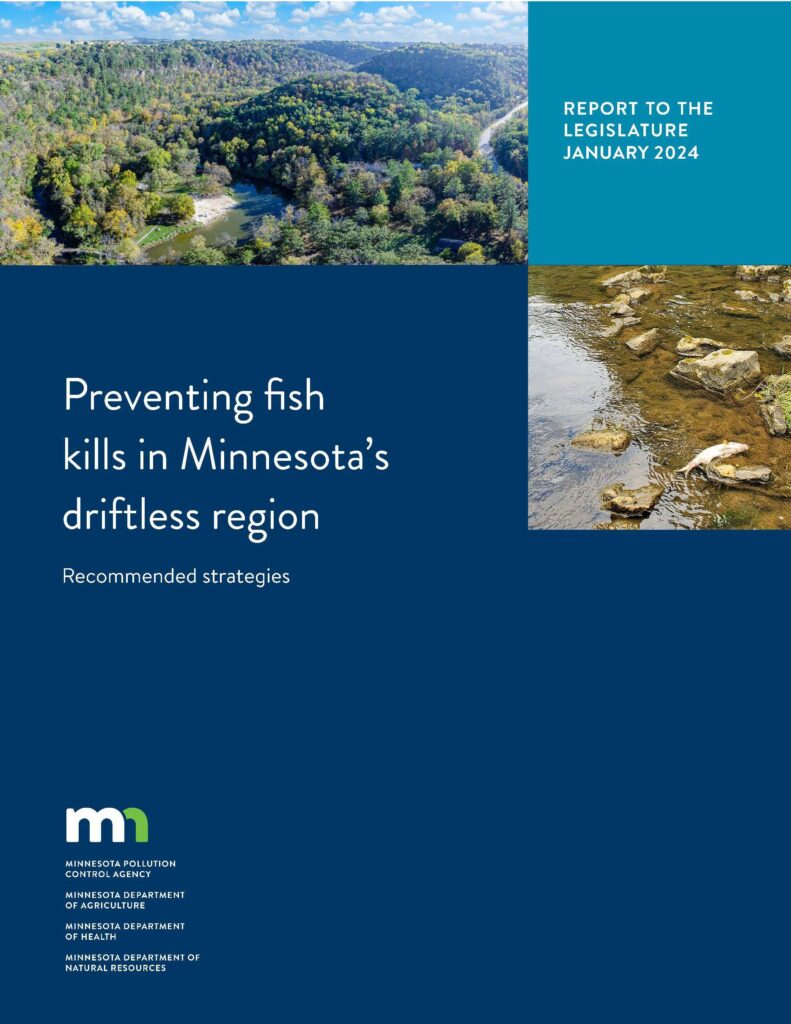Preventing Fish Kills
According to Minnesota state agencies, “Fish kills are caused by the release of pollutants and are different than fish die-offs. Fish kills are infrequent as compared to fish die-offs, and they are acute events.” Threats to fish come in the form of many different toxins that make their way into our streams. Toxins come from agricultural runoff, including pesticides and fungicides, and feedlots, including nitrates. Repeated fish kills indicate it is beyond time the State re-examines their policies including;
- the density of feedlot operations within each watershed
- manure spreading rules and setback requirements (from sinkholes, streams, and steep slopes),
- the adequacy (or failure) of inspections and enforcement
- manure storage requirements on siting and capacity
- timing and amount of pesticide and fungicide applications
Fish Kills in the Karst Since 2015
There have been six significantly documented fish kills in these counties of the Driftless, but this not a comprehensive list. Nitrates and/or ammonia have been implicated in all of these.
According to the Lanesboro DNR fisheries office, here’s a list of six documented fish kills since 2015 in Fillmore, Houston, Winona and Olmsted counties.
- July 2022: Rush Creek estimated 1,875 trout and 625 other fish dead.
- July 2021: Trout Valley Creek estimated 250 trout dead.
- September 2019: Garvin Brook estimated 1,262 trout dead.
- May 2018: Bee Creek estimated 15 trout dead.
- October 2017: Spring Valley Creek estimated 170 trout dead.
- July 2015: South Branch Whitewater River estimated 9,000 to 10,000 trout dead.

How is MNTU Taking Action?
In the Spring of 2023, MNTU drafted and successfully lobbied to pass a bill requiring state agencies to identify measures that could be taken to prevent fish kills. In January of 2024 Minnesota’s Departments of Agriculture, Health, and Natural Resources and Minnesota Pollution Control Agency released, the Preventing fish kills in Minnesota’s driftless region report.
While the Report includes measures to prevent fish kills, no clear step forwards are indicated including timeline, funding and implementation. Threats to coldwater fisheries come in the form of many different toxins that make their way into our streams. Toxins come from agricultural runoff, including pesticides and fungicides, and feedlots, including nitrates. During 2024 MNTU is actively working with partners to demand meaningful and timely revision to the manure management rules, as well as other initiatives focusing on runoff to coldwater fisheries and groundwater springs.
In April of 2024 Minnesota’s Departments of Agriculture, Health, and Natural Resources and Minnesota Pollution Control Agency released the Interagency Fish Kill Response: Guidance Document and Protocol and requested comments. Read MNTU’s thoughts on the document here.
What’s Next?
Stay tuned for opportunities during the 2025 legislative session.
